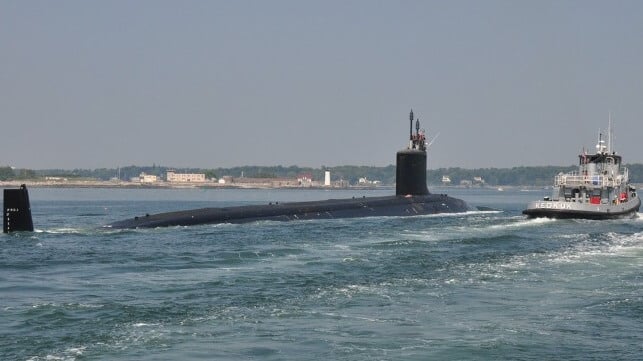Buying Virginia-Class Subs Will Strengthen Australian Sovereignty
Australia is expected to buy as many as five US Virginia class nuclear-powered submarines in the 2030s

[By Justin Bassi and Alex Bristow]
The formal unveiling of the AUKUS plan is still a few days away, but we are already seeing strong signs that it will constitute a genuine trilateral partnership.
If the blizzard of news reports detailing the plan is accurate, the Australian government and its US and British counterparts should be credited with a momentous defence, security and strategic outcome.
Of course, implementing AUKUS will be a mammoth task, requiring long-term investment and resourcing, but, in a world full of partisan politics and protectionist and nationalist tendencies, these three countries have come together, maintaining bipartisanship, and demonstrated an understanding that the collective capability of the three is greater than the individual talent of any country alone.
If AUKUS works—and given the strategic imperative, it has to work—it will strengthen and safeguard Australian sovereignty, not diminish it as some commentators have claimed.
A British-designed nuclear-propelled submarine fitted out with US technology, the acquisition of US Virginia-class submarines as a stopgap, and a strengthened defence industrial base across all three countries will give Australia the best chance not only to defend our national interests but also to play a meaningful role in regional stability.
Along with investment in the advanced capabilities pillar of AUKUS (including cyber, artificial intelligence, quantum and undersea technology) and the requirements set out in the upcoming defence strategic review, these measures will help to strengthen our ability to deter aggression and thereby avoid war, while preparing us to fight if necessary.
Some observers, including former prime ministers Paul Keating and Malcolm Turnbull—both of whom have served the nation admirably—have suggested that the AUKUS submarine pact reduces Australian sovereignty because we will become too reliant on the US.
That is the wrong way to understand sovereignty. It is not about having to design, develop and sustain every capability in and from Australia. Rather, sovereignty is about capitalising on Australia’s strengths in combination with those of trusted and reliable allies and partners.
The Australian government has shown it understands this. As Deputy Prime Minister Richard Marles told parliament yesterday, sovereignty is ‘the capacity of a people, through their government, to determine their own circumstances and to act of their own accord, free from any coercive influence’.
A more secure Australia is a more sovereign Australia. Conventional submarines would have been inadequate to our needs, given Beijing’s sharp military and technological rise, including its anti-submarine warfare capabilities. Nuclear-propelled submarines, however, will increase Australia’s freedom to operate around our region, putting doubt in our enemies’ minds about where their assets are at risk.
This is the essence of deterrence, and the bedrock of our security and sovereignty.
In a world becoming ever more interconnected, national security rests on an interpretation of sovereignty that embraces international partnerships, with trusted and reliable partners, especially the US alliance. The alternative is the seductive myth that Australia can manage its foreign and defence policies in isolation.
This does not mean working with America alone. Australia and our AUKUS partners must embrace the widest range of countries relevant to each defence, security and strategic challenge—from deterrence to human rights. This means, beyond the exclusive submarine initiative, working on critical national security technologies with the full breadth of partners, from the Quad to the G7 and our friends in Europe and the Indo-Pacific.
The alternative is a parochial understanding of sovereignty based on the myth of perfect freedom, falling for the appealing fallacy that we can control our national affairs without regard to those beyond our borders. Its siren call is familiar, and it underpins the rise of populism and Donald Trump’s calls to take back control. Whether we like it or not, national security is now international security.
Bipartisanship in each of the three AUKUS countries will remain vital to ensure there’s a long-term social licence for the necessary defence investment. The messaging that follows the AUKUS announcement and the release of Australia’s defence strategic review needs to be clear about why so much public money, time and investment is being put into defence.
There’s no need for language instilling fear that war is likely within three years. But the three governments need to bring their publics along with them by explaining that AUKUS and the consequent defence investment are necessary because of Beijing’s aggression, its high-quality advancements in military capability, including the rapid expansion of its nuclear forces, and its strategic objectives, which include the imposition of communist rule on Taiwan, by force if necessary.
The narrative for the Indo-Pacific must also be one of grounded reassurance, particularly towards the ASEAN countries, which are often uncomfortable publicly discussing defence matters. This means ensuring a clear understanding that the AUKUS partnership is designed to add to effective deterrence, with the aim being to avoid war.
There is no perfect strategy that provides capability without tension, but transparency through information and engagement is the best approach to counter the risk of disinformation and disharmony that would fill the void of silence.
What’s becoming clear is that AUKUS isn’t just about providing Australia with the crown jewels of nuclear-propulsion technology. It is a recognition from all three countries that technology is at the heart of strategic competition and that future challenges can be overcome only through technological collaboration at unprecedented levels.
As ASPI’s Critical Technology Tracker recently showed, China is ahead in key fields of research. AUKUS is vital to bridging the gap and regaining the advantage.
Justin Bassi is the executive director and Alex Bristow is the deputy director of the defence, strategy and national security program at ASPI. A version of this article was published in the Australian Financial Review.
This article appears courtesy of The Strategist and may be found in its original form here.
The opinions expressed herein are the author's and not necessarily those of The Maritime Executive.
